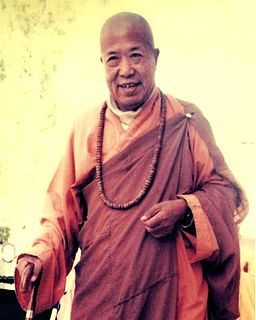A Quote by Hsuan Hua
Buddhism regards all living creatures as being endowed with the Buddha nature and the potential to become Buddhas. That's why Buddhism teaches us to refrain from killing and to liberate creatures instead.
Related Quotes
As I study both the exoteric and the esoteric schools of Buddhism, they maintain that human beings are endowed with Dharma-nature by birth. If this is the case, why did the Buddhas of all ages - undoubtedly in possession of enlightenment - find it necessary to seek enlightenment and engage in spiritual practice?
To you, Christianity, Judaism, Islam, Buddhism, and Hinduism look very different, but to me they look the same. Many of you would say that something like Buddhism doesn't even belong on the list, since it doesn't link salvation to divine worship, but to me this is just a quibble. Christianity, Judaism, Islam, Buddhism, and Hinduism all perceive human beings as flawed, wounded creatures in need of salvation, and all rely fundamentally on revelations that spell out how salvation is to be attained, either by departing from this life or rising above it.
If science proves some belief of Buddhism wrong, then Buddhism will have to change. In my view, science and Buddhism share a search for the truth and for understanding reality. By learning from science about aspects of reality where its understanding may be more advanced, I believe that Buddhism enriches its own worldview.
Regarding the passage on p. 163 of the 'Gleanings': The creatures which Bahá'u'lláh states to be found on every planet cannot be considered to be necessarily similar or different from human beings on this earth. Bahá'u'lláh does not specifically state whether such creatures are like or unlike us. He simply refers to the fact that there are creatures on every planet. It remains for science to discover one day the exact nature of these creatures.






























